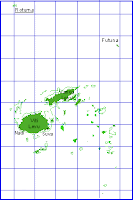
This week is an important one for Rotumans. Some 128 years ago, on May 13th, its chiefs ceded the island to Britain. The occasion was fully reported by the Fiji Times but there was only perfunctory mention of the island's export developments. Compare its report, that makes minimal comment on "positive" Government's role, with the exuberance of the Fiji Daily Post, and the comments made by Rotuman Maj.Gen. George Konrote. Click map to enlarge.
Fiji Times: Rotuma Builds Up to Export Market
Dalo, cassava and kumala will be among the first exports from Rotuma to Tuvalu expected to begin in July. And to boost capacity in the lead-up to that date, the Rotuma Island Council has been given $100,000. Commissioner Eastern Tomasi Tui, who is on the island at present, confirmed the grant would be used through the Rotuma Island Council. This after the Ministry of Agriculture and Fisheries recommended the council set up a business arm to, among other things, operate as an exporter and act as the agency for the trade between Rotuma and Tuvalu. Director of Quarantine Hirangi Foraete said the business arm would also help farmers obtain export licences.
Fiji Daily Post: My extracts from a larger report
Major General George Konrote, former Fiji High Commissioner to Australia and a former cabinet minister in the Qarase Government, speaking on behalf of the Council, told the visiting Government delegation that Rotuma was grateful for Government’s efforts to boost economic development on the island. “In just a short time span," he said, "the Government has turned its focus on Rotuma’s development and this can be seen through the number of commitments it has undertaken here ....Please convey to the Prime Minister our thanks and gratitude for all these developments.”
Information notes added by me
Rotuma, a soil-rich volcanic island of about 43 km2, has a population of about 2,000 and a further 10,000 Rotumans live in Fiji proper. Prior to the 2006 Coup, the Council of Rotuma appointed three members of the Great Council of Chiefs and one member of Senate. Rotumans elected one communal MP, and shared an open electorate with Lau and Taveuni. The Council of Rotuma comprises two elected representatives and, ex officio, the traditional chief of each of its seven districts. Many Rotumans have occupied senior positions in government, the army, and the professions, and some, like Maj.Gen. Konrote, have retired to Rotuma. Others have been succesful in business (Walsh 2006). The deposed former Chief Justice Daniel Fatiaki was a Rotuman.
Tuvalu, independent since 1978, consists of nine atolls totalling 26 km2. The highest point above sea level is 5 metres. Its main island and capital is Funafuti. The population is 12,000, making it the third smallest members of the UN. With virtually no soil and limited crops of breadfruit and giant talo, the main sources of livelihood are fishing and remittances, $4 million in 2006. One in six adult men work on foreign ships. Other income comes from fisheries royalties, royalties from the lease of its ".tv" internet domain name ($US50 over 12 years), stamps, coins and very limited tourism. Substantial income, however, is received annually from the Tuvalu Trust Fund (TTF), established in 1987 by Australia, NZ, and the UK and supported also by Japan and South Korea. TFF,worth $77 million in 2006, supplements government budgets.
1 comment:
Fiji Times reported the new port and other developments earlier, on Tuesday (making the Daily Post late, rather than positive).
Fiji Times coverage of the Rotuma port-of-entry developments stretch back several years.
Your brief "the occasion was reported" summary is a bit perfunctory given the rather detailed coverage: Fiji Times has an editorial on Rotuma (16 May) and a variety of stories about Rotuma Day and celebrationsNot sure about Fiji Sun's coverage: can't find anything today and the search function on their website doesn't seem to show recent stories.
Post a Comment